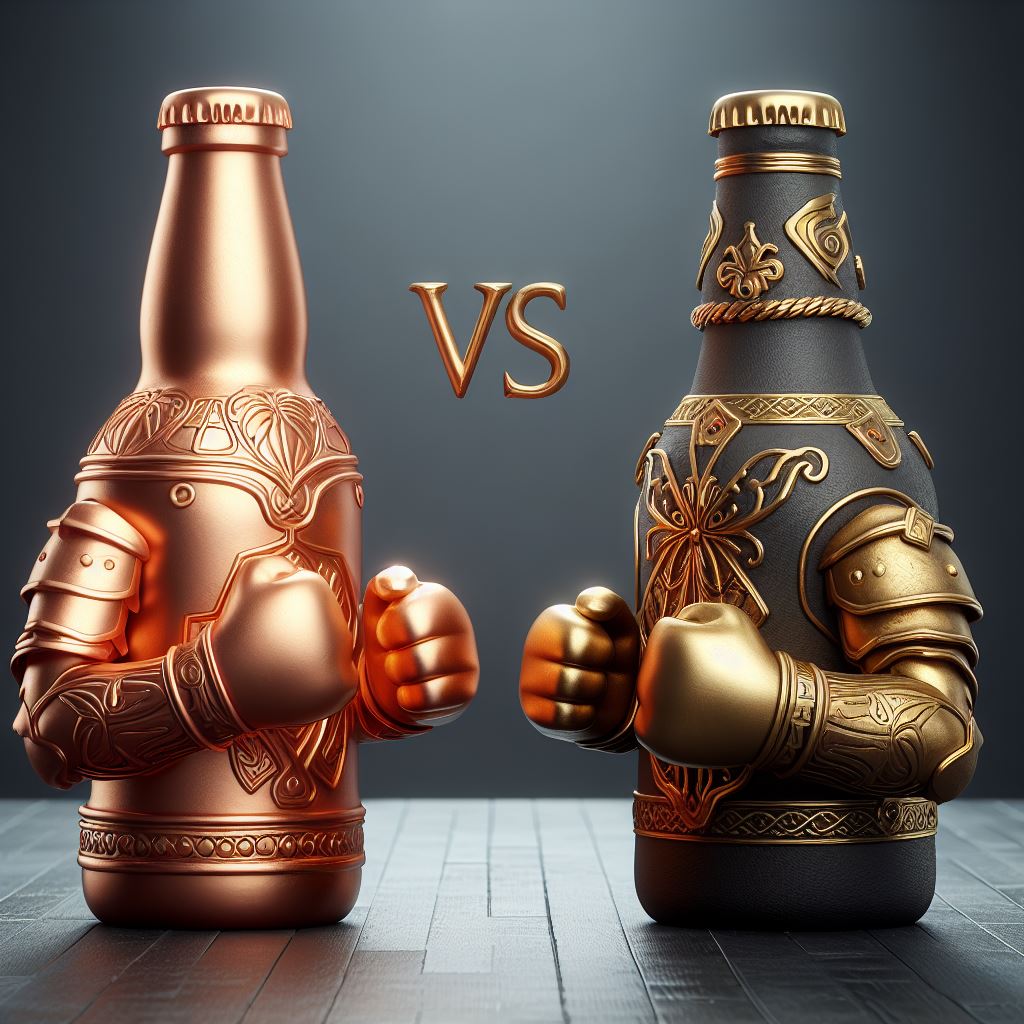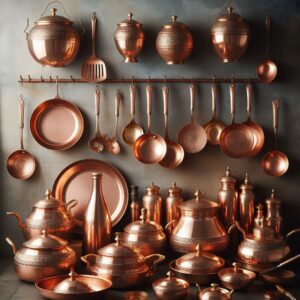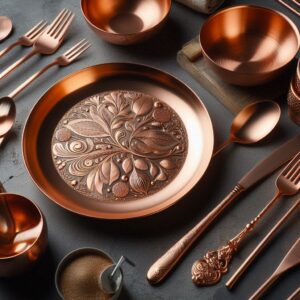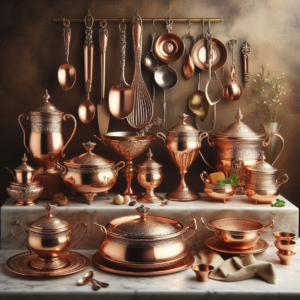Choosing between copper vs. brass water bottles can be challenging. Both materials offer unique benefits for your health and daily wellness routine. This blog will help you decide which one suits your needs better.
Copper water bottles are known for their antibacterial properties. They purify water by killing harmful bacteria, making it safe to drink. This can boost your immune system and improve your overall health. Drinking water from a copper water bottle can also enhance digestion and metabolism.
Brass water bottles, made from a mixture of copper and zinc, also have health benefits. Brass has antibacterial properties similar to copper. It can improve your immune system and support better digestion. However, brass may not be as effective as pure copper in killing bacteria.
Durability is another factor to consider. Copper water bottles are highly durable and resistant to corrosion. Brass is also durable but can tarnish over time, requiring more maintenance. Copper bottles are easier to maintain and can last longer.
In terms of taste, water stored in copper bottles has a distinct, refreshing flavor. Brass bottles might not provide the same quality of taste. If you prioritize taste and health benefits, the best copper water bottles are a great choice.
The Battle of Materials: Copper vs. Brass Water Bottles
Copper and brass are popular materials used in water bottles, each with unique properties. Copper is a natural antimicrobial material, known for its ability to kill bacteria and viruses. It is composed primarily of copper atoms and has been used for centuries due to its health benefits. On the other hand, brass is an alloy made of copper and zinc, combining the properties of both metals. It is known for its durability and resistance to corrosion, making it a practical choice for water bottles. When choosing between copper and brass water bottles, consider your priorities: if you prioritize antimicrobial properties, a copper water bottle may be best. However, if durability and corrosion resistance are more important to you, a brass water bottle might be the better option. Ultimately, both materials offer distinct advantages, so the choice depends on your specific needs and preference
1. Copper Water Bottles
When considering water bottles made from copper, you’re opting for a timeless choice that brings both style and health benefits. Copper water bottles have been used for centuries due to their antibacterial properties, helping to keep your water fresh and safe to drink. These bottles are also known for their durability, making them a reliable companion for daily hydration needs.
Copper water bottles come in various designs and sizes, catering to different preferences and lifestyles. They are easy to maintain, requiring simple cleaning routines to preserve their natural shine and effectiveness. Using a copper water bottle can also add a touch of elegance to your daily hydration routine.
Copper has been revered for centuries due to its unique properties. Here’s why copper water bottles are making a splash:
- Antimicrobial Power: Copper naturally possesses antimicrobial properties. When water comes into contact with copper, it undergoes a process called oligodynamic effect, which helps kill bacteria, viruses, and other harmful microorganisms. Imagine your water bottle as a tiny superhero fighting off invisible villains!
- Health Benefits: Sipping from a copper bottle can offer several health perks:
- Digestive Aid: Copper stimulates the production of digestive enzymes, aiding in better digestion.
- Immune Boost: Copper supports a robust immune system.
- Anti-Aging: It helps maintain healthy skin by promoting collagen production.
- Wound Healing: Copper assists in wound healing and tissue repair.
- Weight Management: Some believe that copper helps regulate metabolism and aids weight loss.
- Maintenance: Copper does tarnish over time, forming a beautiful patina. Regular cleaning with a mixture of lemon juice or vinegar keeps it shiny and pristine.

2. Brass Water Bottles
Brass water bottles are sturdy and stylish options for those seeking a reliable hydration solution. Crafted from a blend of copper and zinc, brass offers a distinct golden hue that adds a touch of sophistication to your daily routine. These bottles are known for their durability, making them ideal for both indoor and outdoor use.
Brass, on the other hand, is an alloy composed of copper and zinc. Let’s explore its unique qualities:
- Joint Health: Brass contains zinc, which is beneficial for joint health. If you suffer from joint pain, a brass water bottle might be your ally.
- No Antimicrobial Properties: Unlike copper, brass lacks inherent antimicrobial abilities. So, if you’re looking for a water bottle that actively fights germs, copper wins this round.
- Durability: Both copper and brass are durable materials. Brass, being an alloy, tends to tarnish less quickly than pure copper.
Real-Life Scenarios
- The Yoga Enthusiast:
- Copper Lover: Our yoga enthusiast practices sun salutations with a copper water bottle by their mat. They appreciate the health benefits and the spiritual connection to ancient traditions.
- Brass Devotee: The brass-loving yogi enjoys the joint support provided by their brass bottle during intense stretches.
- The Eco-Conscious Traveler:
- Copper Convert: Our eco-warrior fills their copper bottle at natural springs, knowing that it not only reduces plastic waste but also keeps their water fresh and germ-free.
- Brass Voyager: The brass bottle accompanies them on hikes, reminding them of the rugged beauty of nature.

Copper vs. Brass Water Bottles: Which One Should You Choose?
Considering a reusable water bottle? Copper and brass are both attractive options, but they have key differences. Let’s explore durability and maintenance to help you decide.
Durability Showdown:
- Copper: Soft and prone to dents. It tarnishes quickly, giving it a vintage look, but also requiring frequent cleaning.
- Brass: An alloy of copper and zinc, making it harder and more resistant to dents. Brass tarnishes slower than copper, but it can still happen.
Maintenance Matters:
- Copper: Regular cleaning with a gentle polish maintains its shine and prevents harmful bacteria buildup. Leaving water in a copper bottle for extended periods can also impart a metallic taste.
- Brass: Requires less cleaning than copper due to slower tarnishing. However, regular cleaning is still recommended to maintain its appearance.
The Verdict?
Copper offers a unique aesthetic and potential health benefits (check with your doctor!), but requires more upkeep. Brass is a lower-maintenance option, but lacks the antimicrobial properties some associate with copper.
Ultimately, the best choice depends on your priorities. Consider your cleaning habits and desired look to find your perfect match!
Temperature Regulation
Looking for a stylish and sustainable way to stay hydrated? Copper and brass water bottles are both eye-catching options, but did you know they offer different experiences when it comes to temperature?
Copper Conducts the Cool:
Copper boasts superior heat conductivity compared to brass. This means copper water bottles excel at transferring coolness. Filling your copper bottle with chilled water keeps it colder for longer, offering a refreshing sip every time.
Brass Keeps it Consistent:
While brass doesn’t conduct heat as well as copper, it does a decent job of maintaining water temperature. This makes it a good choice if you prefer your water to stay at room temperature or only slightly cooler.
Choosing Your Chill:
Consider your preference. Do you crave icy cold water all day? Then, copper might be your perfect match. If you prefer room temperature water or don’t mind it warming up slightly, brass could be a good fit.
Conclusion
Both copper bottle and brass water bottles offer unique advantages. Copper wins for temperature control, keeping your water icy cold. It may also boast health benefits, but check with your doctor first. However, copper requires more cleaning.
Brass is lower maintenance, tarnishes slower, and keeps your water at a more consistent temperature.
The best choice depends on your needs. Do you crave icy water and are willing to put in some extra cleaning effort? Choose copper. If you prefer room temperature water or a low-maintenance option, brass might be a better fit.
Ultimately, both copper and brass bottles are reusable, reducing plastic waste. So whichever material you choose, you’re making a sustainable choice for you and the planet, and staying hydrated in style!











